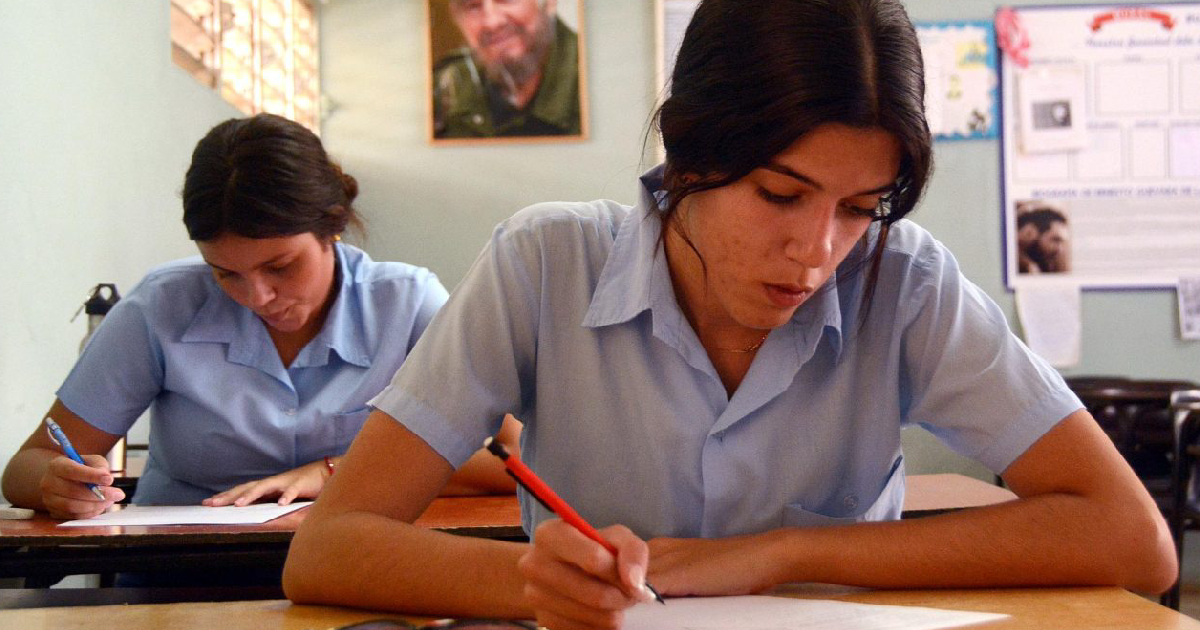The recent Math entrance exam results for Higher Education in Guantánamo have revealed a troubling reality: less than half of the students passed, underscoring the extent to which the country's systemic collapse has infiltrated its educational sector. What was once a challenging but attainable goal has now become an insurmountable obstacle for many young individuals, amidst a national backdrop of institutional decay, shortage of teachers, and educational neglect.
Adding to the complexity is a demotivating factor introduced by the regime's announcement that students could access university degrees and advanced technical programs even if they fail or don't attend the exams. According to the official newspaper Granma, the entrance exams for the 2025-2026 academic year were scheduled for May 6, 9, and 13 for Math, Spanish, and History, respectively. However, the expectation of available spots for those who failed was already publicized, undermining the competitive nature of the process and further eroding the culture of academic effort.
Analyzing the Educational Crisis
Dr. Javier Pérez Capdevila, an Economics Professor at the University of Guantánamo, offered a critical analysis on his Facebook profile, attributing the widespread failure not only to the structural decline of the educational system but also to the extreme conditions under which the exam took place. With a mere 47.2% pass rate, Pérez Capdevila warned that this alarming statistic is a symptom of a deeper crisis affecting mental health, academic performance, and the fairness of the process.
His analysis highlighted that frequent power outages in the days leading up to the exam hindered many students' preparation. Furthermore, the physical conditions during the test—oppressive heat and poorly lit classrooms—made it nearly impossible for students to showcase their knowledge. From an educational psychology perspective, he explained that chronic stress from unpredictable power availability raises cortisol levels, impairing memory, while fatigue from blackouts adversely affects overall cognitive function.
Structural and Environmental Challenges
Pérez Capdevila also criticized the pedagogical aspect of the process, arguing that an exam cannot be deemed valid if it assesses resilience to heat and darkness rather than actual knowledge. He referenced international standards for school hygiene, which set minimum requirements for temperature, ventilation, and lighting—standards clearly not met in Guantánamo. In his view, this transforms the evaluation process into an experience more akin to punishment than assessment.
Ultimately, he suggested reconsidering the exam's repetition as a matter of justice and technical rigor, not as a "handout." Repeating the exam would not "give away passes," he argued, but correct a structural error that distorted the evaluation process. "No young person should be judged based on their ability to endure dark, stifling classrooms, but on what they truly know," he concluded.
Wider Implications Across Cuba
However, these results are neither coincidental nor isolated incidents. Clear signs of educational decline were already evident in other provinces in 2024. For instance, in Ciego de Ávila, high school students taking the entrance exams for Higher Education performed poorly on the Cuban History exam: only 65.01% passed, according to data from the official newspaper Invasor. Out of approximately 500 students tested, over a third failed to achieve the minimum passing grade, demonstrating that the educational collapse is both progressive and systemic.
Frequently Asked Questions on Guantánamo's Educational Challenges
What factors contributed to the high failure rate in Guantánamo's Math entrance exam?
The high failure rate was influenced by the deteriorating educational system, extreme testing conditions, frequent power outages, and a lack of motivation due to the regime's policy on university admissions.
How did the regime's policy affect students' motivation for the exams?
The announcement that students could access higher education even if they failed or didn't attend the exams reduced the competitive nature of the process and undermined students' motivation to perform well.
What are the broader implications of the educational crisis in Cuba?
The educational crisis is indicative of systemic failures across the country, affecting academic performance and fairness, and is part of a larger pattern of institutional decay.
